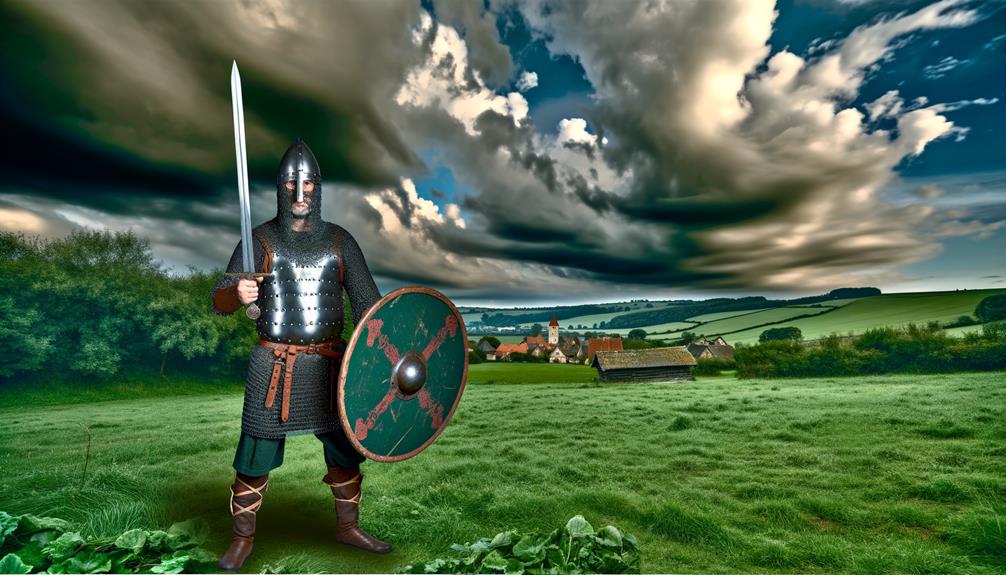Meaning of the Name Saxon
The name Saxon derives from the Old English 'Seaxe' and Proto-Germanic 'sahsa,' meaning 'knife' or 'short sword.' This etymology reflects the martial culture of the Saxon tribes, known for their distinctive weaponry and warrior aristocracy. Originating in northern Germany, the Saxons profoundly influenced early medieval Europe, particularly through their migrations into Britain.
Their societal contributions include advancements in ironworking, seafaring, and legal traditions. In modern times, the name carries connotations of strength and historical depth, appealing to those seeking distinctiveness.
If you explore more, you will uncover intriguing details about the enduring legacy of the Saxon name.

Key Takeaways
- The name Saxon originates from the Old English term 'Seaxe,' meaning 'knife' or 'short sword.'
- 'Saxon' reflects the martial culture and weaponry associated with the Saxons.
- It signifies a historical connection to the Germanic tribes of early medieval Europe.
- The name embodies attributes of strength, reliability, and historical depth.
- Saxon is culturally significant in modern literature, entertainment, and fashion.
Etymology of Saxon
The etymology of the name Saxon can be traced back to the Old English term 'Seaxe,' which itself is derived from the Proto-Germanic word 'sahsa,' meaning 'knife' or 'short sword.'
This nomenclature likely reflects the martial culture and weaponry associated with the Saxons, a Germanic tribe. The term 'Seaxe' was not merely a linguistic construct but also a significant identifier of the tribe's reputation and their prevalent use of the seax, a single-edged knife. This weapon was emblematic of their society and was so integral that it influenced their very name.
The change from 'sahsa' to 'Seaxe' emphasizes the evolution of language alongside cultural and societal developments within the Germanic tribes during early medieval Europe.
Saxon in Ancient Times
The Saxons, originating as a confederation of Germanic tribes, played a pivotal role in shaping the cultural landscape of early medieval Europe.
Their migratory patterns and subsequent settlements greatly influenced the sociopolitical and cultural frameworks of regions like Britain, where their legacy remains evident.
Analyzing the Saxon tribal origins and their extensive cultural influence provides critical insights into the historical importance of the name Saxon.
Saxon Tribal Origins
Emerging from the early Germanic tribes, the Saxons established their presence in northwestern Europe during the early medieval period. Originating in the region that is now modern-day Germany, the Saxons were part of a larger confederation of Germanic tribes. Archaeological evidence suggests that they were skilled in ironworking and seafaring, which facilitated their migration and expansion.
Saxon Cultural Influence
Saxon cultural influence in ancient times manifested through their distinctive language, art, and legal systems, which left an indelible mark on early medieval European society. The Old Saxon language contributed significantly to the development of early Germanic dialects. Their art, characterized by intricate metalwork and elaborate carvings, influenced subsequent European artistic expressions. The Saxon legal system, known for its codified laws and practices, provided a foundation for the development of later medieval legal frameworks. Below is a table that highlights key aspects of Saxon cultural influence:
| Aspect | Key Contributions |
|---|---|
| Language | Old Saxon dialects |
| Art | Intricate metalwork and carvings |
| Legal Systems | Codified laws and practices |
| Social Structure | Clan-based communities |
| Religious Beliefs | Pagan traditions and early Christianization |
This multifaceted influence underscores the enduring legacy of the Saxons in shaping medieval Europe.
The Saxon Tribes
Originating in the northern regions of present-day Germany, the Saxon tribes played a pivotal role in the early medieval period, greatly influencing the sociopolitical landscape of Europe. The Saxons were part of the larger Germanic peoples and were known for their distinct tribal structure, which featured a loose confederation of chieftains rather than a centralized monarchy.
This autonomy fostered resilience and adaptability, aiding their expansion into regions such as Britain. Their social organization was characterized by a warrior aristocracy, free farmers, and a stratified class system. The Saxons' interactions with neighboring tribes and burgeoning European kingdoms profoundly shaped the cultural and political milieu, laying foundational elements for the future development of medieval European states.
Saxon Warriors and Battles
An essential element of Saxon society, the warrior class was highly esteemed and played a central role in the numerous military campaigns and territorial expansions that defined the era. Saxon warriors, known for their formidable combat skills, often wielded weapons such as the seax, a short sword that symbolized their identity.
Battles were characterized by disciplined formations and strategic maneuvers, reflecting their sophisticated military tactics. The warriors' loyalty to their chieftains and kin was paramount, bolstering cohesive and resilient fighting units.
The importance of martial prowess was not merely practical but also deeply embedded in their cultural ethos, as evidenced by burial sites containing weapons and armor, signifying the high status and respect accorded to these warriors.
Saxon Influence on Europe
The Saxon influence on Europe is diverse, incorporating military strategies that reshaped warfare, cultural contributions that enriched societal norms, and political impacts that altered governance structures.
By analyzing their sophisticated tactics and organizational prowess on the battlefield, we gain insights into how they secured and maintained power.
Additionally, their integration into European political frameworks and contributions to cultural development provide an in-depth understanding of their enduring legacy.
Saxon Military Strategies
Frequently characterized by their adaptability and tactical innovation, Saxon military strategies played a crucial role in shaping the geopolitical landscape of early medieval Europe. Their approach combined guerrilla warfare techniques with conventional battle formations, allowing them to effectively counter larger, more organized armies.
The utilization of fortified settlements, known as burhs, provided strategic defensive advantages, securing essential territories. Additionally, the Saxons employed a flexible command structure, enabling rapid response to changing battlefield conditions.
Their proficiency in both naval and land-based combat further expanded their influence across regions. By integrating local knowledge with imported tactics, the Saxons not only defended their territories but also facilitated the expansion of their cultural and political sphere, leaving a lasting legacy on European military doctrine.
Cultural Contributions
Saxon contributions to European culture were multifaceted, encompassing advancements in language, legal systems, and artistic expressions that greatly shaped the continent's development. Their influence on the Old English language laid the foundation for modern English, while their codification of laws introduced structured legal systems. Saxon artistry, particularly metalwork and illuminated manuscripts, reflected high craftsmanship and aesthetic sensibilities, leaving a lasting impact on European art.
| Aspect | Contribution |
|---|---|
| Language | Foundation of Old English |
| Legal Systems | Codification of structured legal frameworks |
| Artistry | Metalwork and illuminated manuscripts |
| Cultural Legacy | Enduring influence on European development |
These contributions illustrate the Saxons' pivotal role in shaping Europe's cultural and intellectual heritage.
Political Impact
How did the Saxons' political structures and governance models influence the development of early European states?
The Saxons introduced a decentralized form of governance characterized by regional chieftains who held significant autonomy, a stark contrast to the centralized Roman model. These chieftains managed local affairs while maintaining allegiance to a higher king, laying the groundwork for feudalism.
Additionally, the Saxons' legal traditions, including the codification of customary laws, influenced early medieval European legal systems. Their emphasis on community-based decision-making fostered participatory governance, contributing to the evolution of parliamentary systems.
The interplay between local autonomy and overarching loyalty provided a blueprint for emerging European states, facilitating a balance between regional independence and national unity, essential for the continent's political development.
Saxon in Modern Culture
In contemporary society, the name Saxon has permeated various aspects of modern culture, from literature and entertainment to fashion and branding, reflecting its enduring appeal and versatility.
In literature, Saxon has been used to evoke a sense of historical depth and strength, often associated with characters embodying resilience and nobility.
In entertainment, it features in various media, including films and television series, where it's often linked to themes of adventure and heroism.
The fashion industry capitalizes on the name's strong, classic connotations, using it in brand names to convey reliability and sophistication.
Additionally, businesses leverage the name Saxon to establish a sense of heritage and trustworthiness, enhancing their marketability and consumer appeal.
Popularity of the Name Saxon
Despite its historical roots, the name Saxon has seen fluctuating levels of popularity over the decades, influenced by cultural trends and societal shifts.
Initially associated with the ancient Saxons, the name experienced a resurgence during periods of heightened interest in medieval history and heritage. However, its usage has remained relatively uncommon compared to more mainstream names. In recent years, there has been a growing fascination with unique and uncommon names, leading to a potential increase in the popularity of Jovani. The meaning of Jovani is often associated with youth and vitality, adding to its appeal for parents seeking a distinctive name for their child. Despite its relatively uncommon usage, the meaning of Jovani and its historical roots contribute to its enduring charm.
In contemporary times, Saxon is often perceived as unique and strong, appealing to parents seeking distinctive names for their children. Data from various baby name registries indicate sporadic but notable increases in its usage, often coinciding with cultural moments or media portrayals.
Notable People Named Saxon
Several individuals named Saxon have distinguished themselves in various fields, contributing to the name's unique cultural and historical footprint. These notable figures span various professions, showcasing the versatility and widespread appeal of the name.
- Saxon White Kessinger, an influential American writer and poet whose works have left an indelible mark on literary circles.
- Saxon Sharbino, a talented actress known for her roles in television and film, demonstrating the name's presence in the entertainment industry.
- Saxon Holt, a respected photographer and author, whose contributions to garden photography have earned him critical acclaim.
These individuals illustrate the diverse arenas in which the name Saxon has achieved recognition, enhancing its cultural significance and enriching its legacy.
Conclusion
The name Saxon, steeped in profound historical significance, conjures images of formidable tribes, legendary warriors, and indelible contributions to European culture. Its enduring legacy, from ancient battlefields to modern society, underscores an unparalleled influence that continues to resonate.
The meticulous examination of its etymology and evolution reveals a name of monumental stature, capturing the essence of resilience and valor. The name Saxon, consequently, stands as a timeless emblem of strength and heritage, commanding unparalleled reverence across generations.






